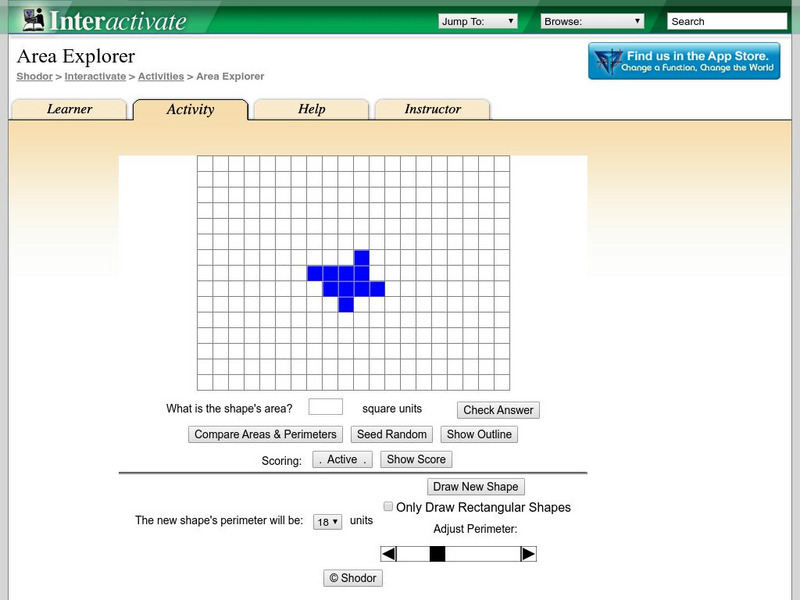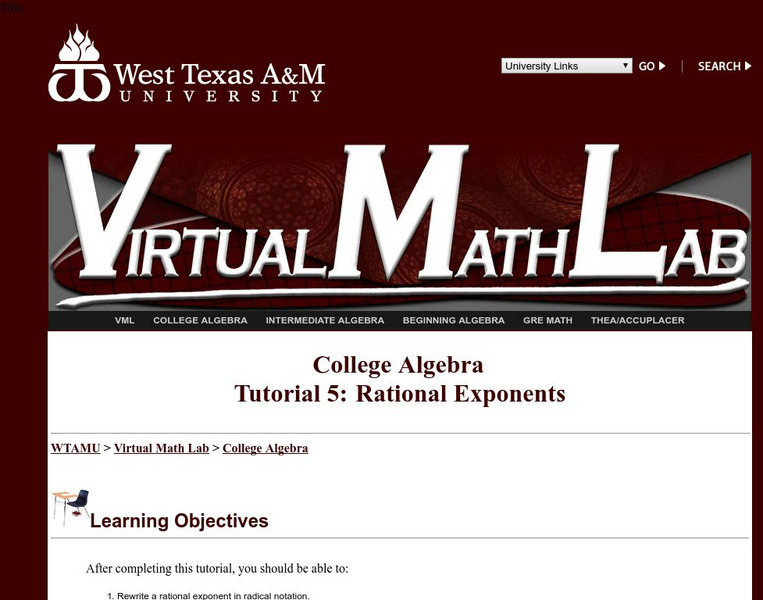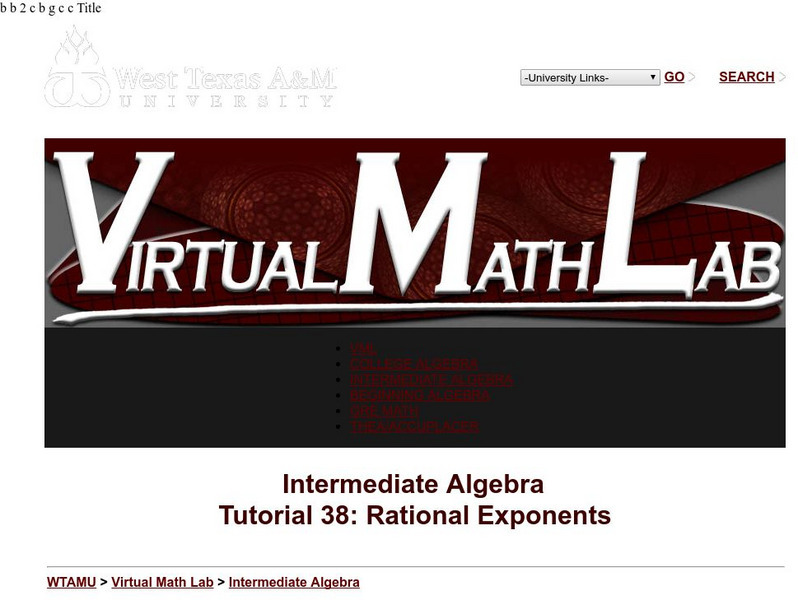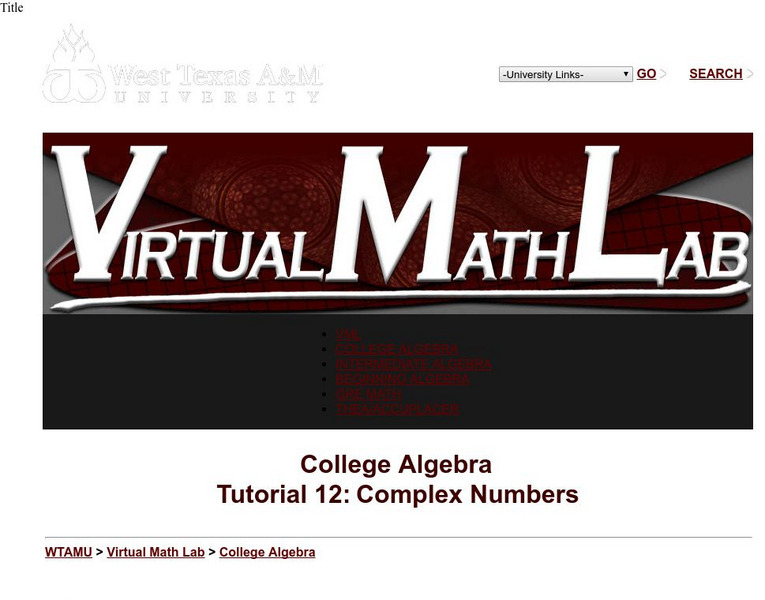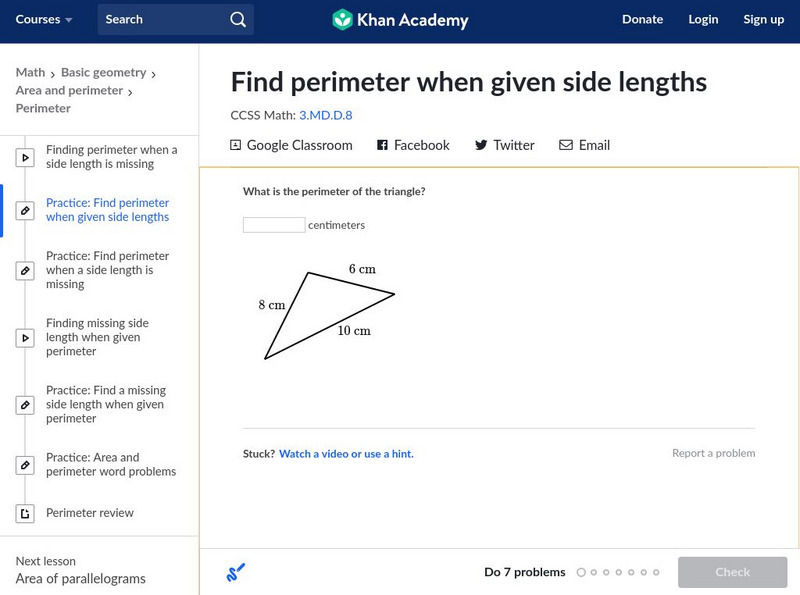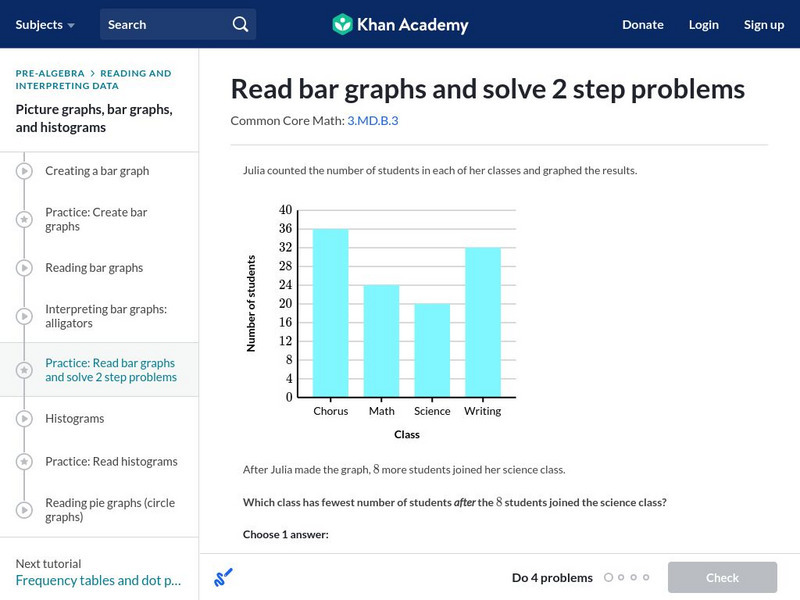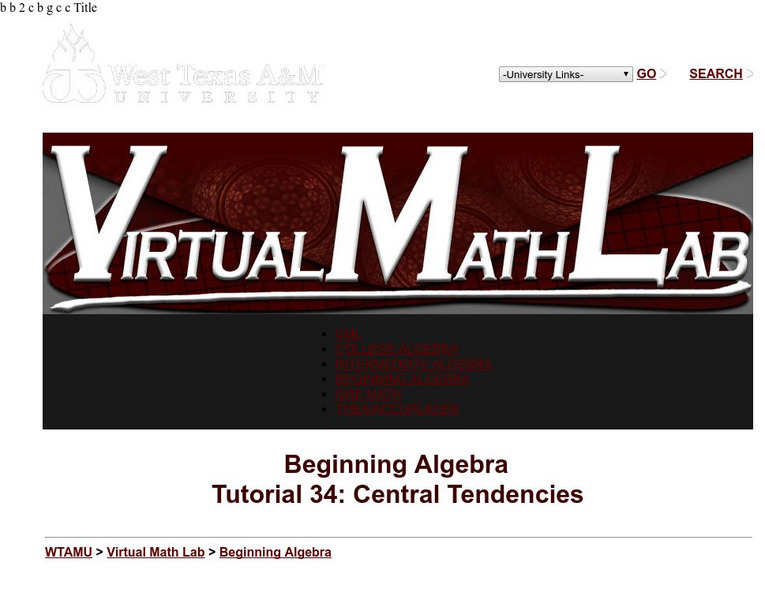National Council of Teachers of Mathematics
The Math Forum: Geoboard Activities
Math Forum provides a set of links to sites that are related to geoboard activities. There are several great links to lessons using geoboards. The links provide insight into how to use them, including how to perform various measurements...
Illustrative Mathematics
Illustrative Mathematics: 6.ns Multiples and Common Multiples
This task asks students to apply the concepts of multiples and common multiples in an abstract context. Aligns with 6.NS.B.4.
Shodor Education Foundation
Shodor Interactivate: Area (Elementary)
In this lesson students will practice finding the area of rectangular shapes and irregular shapes with right angles and understand why the area formula works for rectangular shapes. CCSS.Math.Content.3.MD.C.5.b A plane figure which can...
Texas A&M University
Wtamu Virtual Math Lab: College Algebra: Rational Exponents
In this tutorial, you will learn what a rational exponent is and how to complete many tasks involving them. Follow step-by-step instructions and examples, view video explanations, and hone your skills with several practice problems.
Texas A&M University
Wtamu Virtual Math Lab: Intermediate Algebra: Rational Exponents
An online tutorial which teaches you how to rewrite a rational exponent in radical notation, simplify an expression that contains a rational exponent, and use rational exponents to simplify a radical expression. Works through example...
Texas A&M University
Wtamu Virtual Math Lab: College Algebra: Complex Numbers
Use this tutorial to learn what imaginary and complex numbers are, how to write them, and how to perform operations with them. Offers step-by-step examples, video explanations of the examples, and practice questions with answers.
Khan Academy
Khan Academy: Find Perimeter When Given Side Lengths
Find perimeter of figures when given an image or context. Students receive immediate feedback and have the opportunity to try questions repeatedly, watch a video or receive hints. CCSS.Math.Content.3.MD.D.8 Solve real world and...
Khan Academy
Khan Academy: Read Bar Graphs and Solve 2 Step Problems
Read and interpret a double bar graphs. Students receive immediate feedback and have the opportunity to try questions repeatedly, watch a video or receive hints. CCSS.Math.Content.3.MD.B.3 Draw a scaled picture graph and a scaled bar...
Better Lesson
Better Lesson: Using a Pattern to Solve a Problem
Patterns are prevalent in all levels of math. Common Core Standards expect students to be able to use structure - like that found in repeating the patterns of odd and even numbers or counting by 5s or 10s - to solve problems (MP7).
Scholastic
Scholastic Lesson Plan: New Way to Measure Area
This article describes a new approach to teaching children more than just memorizing a formula to find area and hope they don't confuse it with perimeter. This approach involves a project with real life situations....
Doina Popovici
Math Play: Compare Decimals Math Racing Game
Race your way to the finish line with this math game where you compare decimal numbers to race ahead!
Johan Claeys
Math Abundance: An Introduction to Complex Numbers
A complete explanation of complex numbers that includes lessons on adding, subtracting, multiplying, and dividing them, as well as more advanced topics.
Texas A&M University
Wtamu Virtual Math Lab: Beginning Agebra: Central Tendencies
A tutorial to understand the three central tendencies and how to find them, as well as the standard deviation of values. Offers a discussion and practice problems.
Wolfram Research
Wolfram Math World: Complex Conjugate
This site contains an explanation of complex conjugates. Then it goes on to list and display charts and formulas. Links are also provided for additional information.
National Council of Teachers of Mathematics
The Math Forum: Paper Folding Activity
This is a lesson plan of paper folding as a method of proof. A Java applet version of the activity can be accessed, giving the actual lengths and angle sizes.
Washington State University
Washington State University: Math 101: Solving Linear Inequalities
This page covers topics involving linear inequalities including properties used to solve inequalities, how to write solutions, solving simple inequalities, and solving compound inequalities.
Other
Brown Math: How to Convert Units of Measurement
This site has a detailed step-by-step instruction of how to convert units of measurement. Multiplying by 1 is explained as are compound units, and finding conversion factors. The discussion is slowed down for students who may have missed...
University of Georgia
University of Georgia: Inter Math: Box and Whisker Plot
Description of box-and-whisker plots and their uses, along with a visual representation. There are links to related terms, everyday examples, more information, and the interactive checkpoint involving box and whisker plots located in the...
Better Lesson
Better Lesson: Time and Money
As the result of a Unit assessment, it was found that students showed some confusion with writing time and with adding sets of coins. These skills need to be reviewed to aid in mastery of the Common Core standards for time and money.
Better Lesson
Better Lesson: More Dimes and Dollars
Second graders need practice using coins and dollars and relating them to ones, tens and hundreds. Common Core standards include counting by 10s and 100s.
Better Lesson
Better Lesson: Balancing and Comparing Data
The connection between subjects is an important one to establish for students. Communicating across subjects is part of the Common Core expectations.
Better Lesson
Better Lesson: Our Understanding of Numbers
This lesson is an informal assessment of student understanding of the base ten system, a critical area in the Common Core.
Better Lesson
Better Lesson: We Can Guess the Number
Understanding place value is critical to the Common Core Standards for second grade. Without a concrete understanding, 2nd graders may not fully grasp the meaning of the digits.
Better Lesson
Better Lesson: Moving Along in Hundreds
The Common Core standard is that students understand that the numbers 100, 200, etc. represent so many groups of 100.
Other popular searches
- Common Core Math
- Common Core Math Lessons
- Math Common Core Lesson Plans
- Math Common Core Standards
- Common Core Kindergarten Math
- Common Core Math Fractions


